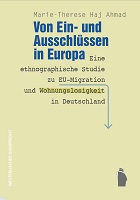Von Ein- und Ausschlüssen in Europa
Eine ethnographische Studie zu EU-Migration und Wohnungslosigkeit in Deutschland
| dc.contributor.author | Haj Ahmad, Marie-Therese | |
| dc.date.accessioned | 2023-08-08T12:26:59Z | |
| dc.date.available | 2023-08-08T12:26:59Z | |
| dc.date.issued | 2022 | |
| dc.identifier | OCN: 1404875660 | |
| dc.identifier.uri | https://library.oapen.org/handle/20.500.12657/75308 | |
| dc.description.abstract | In her ethnographic study, Marie-Therese Haj Ahmad turns to the interface of intra-European migration and homelessness. The focus is on questions of transnational social rights as well as social work practice in this field of action. The readers accompany a fictitious character to various places that are relevant for homeless EU citizens: a social welfare office, a doctor's practice for homeless people and a day centre for homeless people. There they witness the negotiations and struggles for (social) rights, recognition and social justice. In them, the violent history of Europe appears, which continues to this day in intra-European differentiations and exclusions. Racism, anti-Slavism and classism characterise the everyday life of homeless EU citizens. At the same time, it becomes clear that although social work is part of the inner-European border regime, it can also have a resistant effect within it. Finally, the study shows how the practice of intra-European migration challenges the narrative of a homogenous EU-Europe as a place of equality and human rights. | en_US |
| dc.language | German | en_US |
| dc.subject.classification | thema EDItEUR::J Society and Social Sciences::JH Sociology and anthropology::JHM Anthropology::JHMC Social and cultural anthropology | en_US |
| dc.subject.other | Ethnographic study; European migration; homelessness; social rights; social work | en_US |
| dc.title | Von Ein- und Ausschlüssen in Europa | en_US |
| dc.title.alternative | Eine ethnographische Studie zu EU-Migration und Wohnungslosigkeit in Deutschland | en_US |
| dc.type | book | |
| oapen.abstract.otherlanguage | Marie-Therese Haj Ahmad wendet sich in ihrer ethnografischen Studie der Schnittstelle von innereuropäischer Migration und Wohnungslosigkeit zu. Dabei stehen Fragen nach transnationalen sozialen Rechten ebenso im Fokus wie die sozialarbeiterische Praxis in diesem Handlungsfeld. Die Leser*innen begleiten eine fiktive Figur an verschiedene Orte, die für wohnungslose EU-Bürger*innen relevant sind: ein Sozialamt, eine Arztpraxis für wohnungslose Menschen sowie ein Tagesaufenthalt für wohnungslose Menschen. Dort werden sie Zeug*innen der Aushandlungen und Kämpfe um (soziale) Rechte, Anerkennung und soziale Gerechtigkeit. In ihnen scheint die gewaltvolle Geschichte Europas auf, die sich bis heute in binneneuropäischen Differenzierungen und Ausgrenzungen fortsetzt. Rassismus, Antislawismus und Klassismus prägen den Alltag wohnungsloser Unionsbürger*innen. Zugleich wird deutlich, dass Soziale Arbeit zwar Teil des innereuropäischen Grenzregimes ist, aber auch widerständig darin wirken kann. So zeigt die Studie schließlich, wie die Praxis der innereuropäischen Migration das Narrativ eines homogenen EU-Europas als Ort der Gleichheit und der Menschenrechte in Frage stellt. | en_US |
| oapen.identifier.doi | 10.56715/398634130 | en_US |
| oapen.relation.isPublishedBy | Verlag Westfälisches Dampfboot | en_US |
| oapen.relation.isFundedBy | 631ac483-8bae-460f-9987-c3f4e4b98bb5 | en_US |
| oapen.relation.isFundedBy | ac7aa491-fd52-447f-a2bb-3e8052dc41dd | en_US |
| oapen.relation.isbn | 9783896910783 | en_US |
| oapen.collection | DFG - German Research Foundation | * |
| oapen.pages | 246 | en_US |

